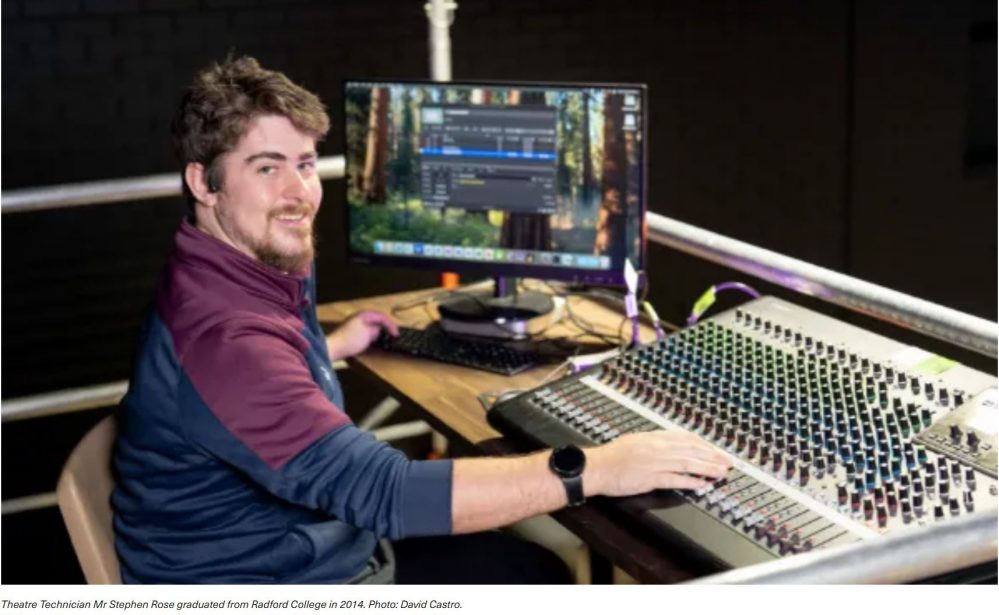Life after Radford with Stephen Rose, Class of 2014
Life after Radford with Stephen Rose, Class of 2014
After graduating a decade ago, Mr Stephen Rose built a successful career in the performing arts industry before returning to share his expertise with the next generation of students. From memorable productions to the day-to-day responsibilities of his job, Mr Rose offers valuable insights into his journey and how his own experiences at Radford shape his approach to teaching and mentoring students today.
You graduated from Radford College in 2014. What has been your experience between leaving the College as a student and returning as an employee?
It didn’t take me long to return to Radford as an employee. In 2016, I worked in a similar role as a casual staff member, assisting with Radford’s annual productions. Over the years, I continued to lend my support where possible, balancing it with my other professional commitments in the industry. Late last year, when the permanent Theatre Technician position was advertised, I saw it as the perfect opportunity and applied. I’m grateful to have been selected for the role.
What attracted you to apply for the Theatre Technician role?
The full-time, permanent position allows me a greater opportunity to share the knowledge I gained while working professionally to better prepare students interested in pursuing a technical career in the performing arts. I believe it’s crucial to pass on my knowledge given our industry is still lacking skilled technicians in various specialty fields due to the effects of COVID shutdowns.
How do you think your own College experience will lend to your role and the experience you can share with students?
My experience as a former student gives me a unique perspective that allows me to easily relate to current students and explain the reasoning behind our production methods. I can clearly articulate why we sometimes teach two different approaches to achieving the same result: one that aligns with professional standards and another that’s more practical for Radford productions. These practical methods take into account the unique constraints of our spaces and timelines—challenges I personally navigated as a student.
What is one of the most memorable productions you’ve worked on as a theatre technician?
It would have to be working on the 2017 Mamma Mia! musical when it was revived as a brand-new show, complete with a new set, lighting design and more. The show’s tour started here in Canberra and it is one of the biggest productions I’ve worked on, with 11 semi-trailers worth of equipment and set to unload and build at Canberra Theatre. I was one of the lighting technicians and lead follow spot operator for the season, ensuring every jump and run by the actors was fully captured in bright, circular light! It was such a thrill to see all the hard work pay off on the opening night, with sold-out audiences and standing ovations. It was undoubtedly one of the most challenging yet satisfying productions I’ve ever worked on.
The role of a Theatre Technician must be varied. What’s your typical working day like?
It is extremely varied! I can go from hanging roof lights and running cables to doing material engineering research to ensure the safety of what we build. A typical day involves researching, prototyping, procurement for upcoming productions and moving equipment around the hall in preparation for the next production or class.
People would be surprised to know…
Many people would be surprised by the immense effort that staff and students have invested over the past 40 years to transform the T.B. Millar Hall into a performance space. With recent upgrades, including a fresh coat of black paint, stage improvements and the addition of two new technical staff members, I believe they’ll be equally amazed by what students can now accomplish. With the hall’s transformation largely complete, students can now concentrate more on the finer details within their specific areas of technical work, rather than dividing their focus on preparing the space itself.

